Archive for the ‘No Thief Movie Review’ Category
The Host (2006)
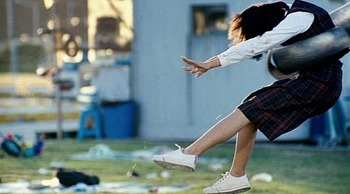 The Host
The Host
★★★☆☆
Directed by: Joon-ho Bong
Written by: Joon-ho Bong, Won-jun Ha and Chul-hyun Baek
Rarely do I find myself so torn between star ratings. I refuse to dip into the namby-pamby arena of half-stars, extending my five (or technically six) point scale to ten points just so I can split the difference between “It Was Okay” and “Didn’t Like It.” But let’s just say that while I’m settling on three stars for The Host, it’s really a two and a half star movie, one which I just barely tolerated above dislike but which I also came just short of feeling like I wasn’t sorry I had spent the time to watch it.
The real issue with The Host is that I admire it for trying something different. This is a movie that could have gone a half dozen different directions: Full blown monster horror pic; creepy enviro-action flick; tense suspense drama; political satire/allegory; subversive genre send-up; dark character drama with supernatural framework. Instead of picking one of these paths, The Host picks them all. I respect the moxie of the filmmakers for doing something that is so un-Hollywood (obvious guy says duh, this is a Korean film). However, in dividing the film’s—and the audience’s—time and attention into all these things, we end up with a mishmash of a picture that can’t seem to decide what, if anything, it wants to say.
There are pivot points in the movie where the filmmakers could have selected their vehicle and ridden it to whatever destination lie down that path. But each one is meticulously sidestepped so that we can have key (undeveloped) characters that aren’t introduced until well past the halfway point, a curiously unsatisfactory conclusion, a bizarre character event near the end that seems to have no impact on the protagonist, a lot of pretty rough CG effects and an awful lot of the main characters running around aimlessly for long stretches of the film. There is a metaphor in the characters actions for the writer’s intents, but like the writers themselves, I can’t be bothered to make it work. So my final recommendation is go watch The Host. Or don’t. Really, it doesn’t matter either way.
The Expendables (2010)
 The Expendables
The Expendables
★★☆☆☆
Directed by: Sylvester Stallone
Written by: David Callaham and Sylvester Stallone
What amused me the most about The Expendables is how there is zero emotional heft to the film, and the protagonists are never in serious danger. You might think, in a film like this where there are a half-dozen roughnecks as the principals, that one or more of them was destined to croak in your standard action/buddy formula to provide a reason for the survivors to rally and defeat the odds. But no. Everyone lives. I guess that’s a spoiler? The thing is, it’s never really even implied that one of these guys might not make it. They take down literally hundreds of apparently highly-trained soldiers with the realism and nonchalance of saturday morning G.I.Joes, only with more blood and shorn body parts and stuff.
I guess this is supposed to be an old-school action film with practically every 80s and 90s action star under the sun, but even though we’re supposed to care that Jason Statham’s Lee Christmas lost his girl to a douchey jock, it’s not possible because Lee Christmas is not a character but a tool for the script to show that even guys who stick knives into people’s necks for a living feel sad sometimes. There’s some sort of claptrap about these mercenaries doing things for a greater cause, but it’s muddy and uninteresting. There’s one scene that could be decent but it’s like something from another movie, where Mickey Rourke as Tool reminisces about the darkness that weighs on a conscience from senseless brutality, but whatever power could have come from a monologue like that is comically undone by the gleefully senseless brutality the movie traffics in to sell itself. I guess it’s okay to watch people being cut apart for entertainment but if you have to do the cutting it makes you wax poetic in a blue light? I didn’t really get what it was all about. Really it’s just some random words to make the audience feel like there is a moral imperative for Stallone and Statham and Jet Li and some other people to go slaughter people.
There’s really no point to this movie, which I say knowing full well that when I started watching it I just wanted to watch a big dumb action movie. I guess it barely succeeds at that, but nothing else going on is worth much of your time, except to remind yourself occasionally that Stallone is old enough to be Jason Statham’s dad, is old enough to be the grandfather of Giselle Itié (who is the sorta love interest, Sandra) and yet somehow manages to not be comical just on a surface level as he engages in cinematic fisticuffs with Stone Cold Steve Austin. It’s pretty impressive, really.
Hot Tub Time Machine (2010)
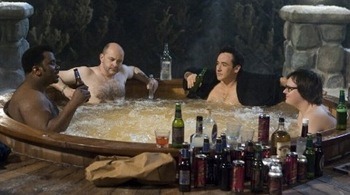 Hot Tub Time Machine
Hot Tub Time Machine
★★☆☆☆
Directed by: Steve Pink
Written by: Josh Heald, Sean Anders and John Morris
Admittedly, you can’t go into a movie called “Hot Tub Time Machine” with high expectations. But I did kind of think that it had the potential to be a stupid/silly good time, and attributed the fact that it doesn’t have much community love to the fact that the premise is ridiculous. I was in a mood where ridiculous premises were okay by me, so I gave it a shot. The thing is, the premise isn’t the problem here, and in fact it’s a medium entertaining dude-oriented romantic comedy (which is to say it’s very bromantic). That should be enough to earn it a modest three stars. The main problem is that it isn’t very funny. I could forgive almost everything else that Hot Tub Time Machine struggles with if only there had been some decent laughs, but there are really none.
The truly distasteful aspect of the movie, though, is that it seems like the moral of the story is that the only way you can change your life for the better is by going back and doing it all over again, making completely different decisions. Apparently, it also helps to have the deck stacked heavily in your favor. There was even the potential for something along those lines to be said in a funny, ironic or ridiculous fashion considering the means for the shift comes from the character who seems to be the most stuck in the past at the start of the film. But never mind all that, because Hot Tub Time Machine may have potential, but it squanders all of it at every opportunity and leaves in its wake a silly trifle that is safely and easily skipped.
Captain America and Thor (2011)
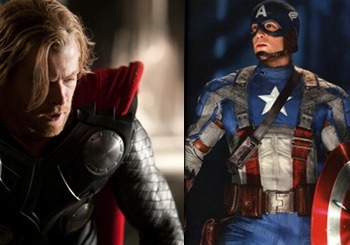 Captain America: The First Avenger
Captain America: The First Avenger
★★★★☆
Directed by: Joe Johnston
Written by: Christopher Markus and Stephen McFeely
Based on the Comic Book Created by: Jack Kirby and Joe Simon
Thor
★★☆☆☆
Directed by: Kenneth Branagh
Written by: Ashley Miller, Zack Stentz, Don Payne, J. Michael Straczynski and Mark Protosevich
Based on the Comic Book Created by: Stan Lee, Larry Lieber and Jack Kirby
I mentioned in my review of Iron Man 2 that Tony Stark and his alter ego were underdog favorites of mine as a kid. The same cannot be said of Captain America or Thor. Something about Captain America’s pseudo-sissy non-weapon of choice and his principal focus of patriotism made him a big yawn for me. Thor on the other hand, I just didn’t get. His costume was lame, he was based on Norse mythology which was kind of cool but then he was somehow involved in the rest of the Marvel continuity and he just felt like a Superman ripoff somehow. I dunno, I guess I’m funny about superheroes.
But the thing is, the characters themselves don’t really matter. What makes a comic book story interesting is not the origin story or the costume or the powers, it’s the story and what you do with the character that makes the difference. And from everything I ever tried, Thor and Cap always had boring books. However, as I also mentioned in my Iron Man 2 review, I’ve gotten pretty amped for the upcoming Avengers movie so I felt it my duty as an occasional comic book nerd and frequent movie dork to “catch up” as it were with the in-movie continuity. I rented both and watched them back to back.
What struck me initially was the difference in quality between the two flicks. Had you asked before I watched them both which I was likely to enjoy more, I’d have probably put my money on Thor as being the better of the two. The surprising thing is, I enjoyed Captain America immensely more than Thor.
This is a double review so let’s start with the weaker of the two. The principal problem with Thor is that it had way too many writers involved. Any time you see more than one or two names on a writer’s byline, it’s worth being cautious. Thor is a mess because it has too many characters, tries to cover too much ground and can’t possibly cram everything into its two hour running time. Now, lots of characters aren’t necessarily a bad thing, but lots of characters who have to portray believable relationships with themselves and lots of characters that need compelling arcs means you have to be laser focused to get it all into a standard length film. Consider: We have our title protagonist, Thor, who must have a principal arc himself, plus he needs relationship arcs with each of the following: His father Odin, his brother Loki, his band of warrior-friends (ideally this would be individual, with so much else going on it has to be collective, which means these characters ought to be combined into one or two at the most; here there are four) and his Earthly love interest, Jane. There is also the matter of his mother, Frigga, S.H.I.E.L.D. agent Coulson, the transporter guardian Heimdall and the leader of the sworn enemies of Asgard, frost giant King Laufey, each of whom should have some kind of purpose in the film but whom for various reasons can’t possibly get enough development to ever matter.
There is enough story inherent in the Thor/Loki/Odin dynamic, along with the frost giant threat and King Laufey, to make for a full and complete movie. There is also enough story in the dynamic of Thor losing his power, being cast to Earth and having to prove himself while he learns to love humans through the proxy in Jane for a complete movie. What you can’t do is take two entire arcs and try to interweave them or overlap them and hope that somehow, magically, they end up being complete as the sum of their parts. It’s too much to ask of everyone involved. Some of the things that get lost in this particular shuffle: a believable relationship between Thor and Jane; a believable character arc for Loki; a purpose for the frost giants and/or King Laufey; a coherent connection to S.H.I.E.L.D.; an explanation for why Heimdall has so damn much screen time and development when other characters like, say, Odin or Loki, do not.
It’s not easy to pinpoint the exact source of the problem, apart from an overly ambitious script. Chris Hemsworth—well, he certainly looks like Thor, I’ll give him that. He’s pretty good at portraying the cocky bravado of the pre-exile Thor, but he struggles to convincingly display character growth so that when he inevitably learns to deserve his powers it kid of feels like, “Uh, yeah, sure. Okay.” And bless Natalie Portman’s pretty heart: she is one of the most inconsistent actresses around. Given challenging, dynamic, expectation-busting roles (Closer, Black Swan, The Professional) and she can stand up with the best in the biz. But she advertises her satisfaction with the shoot and the script on her sleeve, and if she’s asked to come across as the girl next door, or she’s asked to put impact into flat dialogue, she struggles to even be believable as a human (Star Wars, Mars Attacks). Anthony Hopkins and Renee Russo are wasted as Odin and Frigga, and Tom Hiddleston gamely gives his Loki what he has, but he’s no match for a script that can’t seem to decide what he’s supposed to be from one minute to the next.
What really frustrates about Thor is that it gets so caught up in its story that it forgets to even be big dumb fun. There are precious few special effects-laden action sequences, though there are an awful lot of scenes of people getting teleported in the Bifrost portal. I mean, there are so many that it starts to get funny. The Bifrost ends up being the most well-rounded character in the whole film, and its demise is the one that had the most emotional impact. Actually, I take that back because excepting King Laufey and the non- or semi-sentient Destroyer robot thing that Thor and friends fight at the end, everyone else makes it out alive. Not exactly high stakes for the good guys, you know? One early battle sequence between Thor’s warriors and the frost giants is pretty visually stimulating, but after that all the action is far inferior to even the Black Widow infiltration scene from Iron Man 2. If you can’t outdo Scarlett Johansson in spandex and you’re a friggin’ GOD—
Well, actually, I can see how that would be hard to stack up against. Anyhow.
So after Thor, I wasn’t really having high hopes for Captain America. But I was amazed to find that it was actually much, much better than Thor. The main thing Captain America does right that Thor doesn’t is it sets up the Rip Van Winkle bit at the very beginning and very end of the movie, but 98% of it is all origin story set in World War II. Now, I’ll grant that the set up of Steve Rogers being this wimpy little pencilneck and having beefcake Chris Evans play him with CGI kind of like a reverse Hulk effect is a bit transparent sometimes. But, I’ll be honest. You can tell in The Hulk that they got away with some cartoony effects because typically when the big green guy is onscreen, he’s jumping around, flinging Mack trucks and dodging tank shells. These are action scenes and we’ve trained ourselves as the audience to let go of some of our visual disbelief when the fightin’ starts. So it’s impressive that nearly every effects shot of Steve Rogers is a slow, lingering, well-lit shot and it almost always works.
The story follows über-patriot Rogers as he tries to enlist in the army but is constantly thwarted by the bad genetic hand he was dealt. A German expat, Dr. Erskine, working with the US Army against the Nazis, selects Rogers to be part of an experimental program to make super soldiers. The result of the serum and some tech help from a young Howard Stark (father of Iron Man’s Tony), the transform the scrawny Rogers into a muscle-bound badass with strength, speed, agility and stamina beyond any normal human. A saboteur from a fringe occult research branch of the Nazi party, Hydra, infiltrates the experiment and tries to steal Erskine’s serum. Rodgers stops him, but Erskine dies in the process, setting the program back. Rogers is then facing two options: settle for life as a professional lab rat, or try to do something to help. He agrees to become a pitchman for the Army, doing traveling bond promotional shows, and seems to be more or less into it until he goes to do a show for some actual front line troops who are disgusted by his phony showboating and boo him off the stage. When he realizes they’re so hostile because he’s a pretend soldier while they just got practically wiped out by Hydra, Rogers, aided by skeptical love interest Peggy Carter (played with smooth British charm by Hayley Atwell, channeling Eva Green’s Vesper Lynd from Casino Royale), stages a daring rescue.
Rogers begins to embrace his abilities and the Army falls in line, granting him leadership over many of the rescued POWs to form a task force specifically designed to combat Hydra, who are growing immensely powerful under the leadership of Johann Schmidt, also known as Red Skull. Red Skull happens to be the only other person to have received the serum, albeit in an earlier form that left him deformed with a blazing red, skull-like visage.
The nice thing about Captain America is that it uses a straightforward, classic hero’s quest tale to give a sense that you’re really watching an old comic book come to life. The action is stylized and unrealistic, but believable despite and it never goes so far off into lunatic territory that it feels it has to somehow out-tech Iron Man, set some eighty or ninety years in the future. Hugo Weaving turns in a toothy, fun performance as the generically megalomaniacal Red Skull, and the screenwriters resist the temptation to have Captain America rewriting history by getting in a fist fight with Hitler or something. Evans as Rogers is convincingly napoleonic when necessary and does some nice physical acting work early on after getting his powers, showcasing his excitement and glee at finding out what his newly juiced body is capable of. He has legitimate chemistry with Atwell and Tommy Lee Jones turns in a classic performance that is tailor made for his brand of deadpan delivery.
The movie does bog a little right before the climax with some extended montages of Captain and his pals busting up Hydra, and the Bucky character felt kind of shoehorned into the plot to give Cap a bit of emotional turmoil, but all of it is forgivable. My one complaint is that, in spite of my appreciation for them only bookending the film with the present day connection, Evans’s acting stumbles a bit right at the end when he’s supposed to be in awe of the modern world, so different from the one he remembers. Perhaps the script is what fails here, not giving him enough time to react, but there is just something about the whole scene that doesn’t work, and I’d almost expect it to have been something that occurred early in The Avengers film, not as a sour note to leave an otherwise very good movie on.
I think, somewhere between the excellent first two Iron Man films, a half-decent Hulk movie, a very good Captain America vehicle and a mostly bad Thor, there’s enough reason to be incredibly hopeful for the forthcoming Avengers. Maybe I’m also biased because Joss Whedon is behind the team-up flick, and I happen to think he rarely goes wrong, but Marvel Studios has been doing a lot of things right lately, and I think even though the average of these two movies is only three stars, I’m ready to pull down my fanboy goggles and line up opening weekend for The Avengers.
Butch Cassidy And The Sundance Kid (1969)
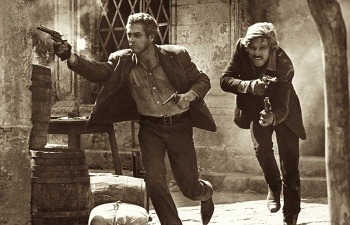 Butch Cassidy And The Sundance Kid
Butch Cassidy And The Sundance Kid
★★★★☆
Directed by: George Roy Hill
Written by: William Goldman
The well-deserved Oscar William Goldman received for writing Butch Cassidy And The Sundance Kid wouldn’t have amounted to much without the smooth, masculine chemistry between Paul Newman and Robert Redford, who sell the hell out of the roles. As an overall film, the movie is a bit measured for modern tastes, with the extended chase scene in the middle setting up a montage before skipping down to Bolivia where the third act unfolds. The subtle love triangle between Butch, Sundance and Etta Place is probably the second best part of the film, behind the cool and funny banter exchanged by the two principals.
Oddly, the thing that sits the most awkwardly, at least to my modern eyes and ears, is the Burt Bacharach score (which also won an oscar) and the 60s pop tunes that bubble and fizz over the top of the film. I guess the general cheesiness associated with “Raindrops Keep Fallin’ On My Head” in 2012 may not have been so freely associated in the late 60s, but it (and the other syrupy scoring) glares like a bubblegum chewing beast of a child within the context of the stylish cool of the performances and cinematography. I guess it’s simply a part of the film and you have to take it as a package (after all, its not like musical atmosphere is a new development; movies have been scored with tonally appropriate background music for decades before and since) but for me it mars an otherwise excellent film.
Before The Devil Knows You’re Dead (2007)
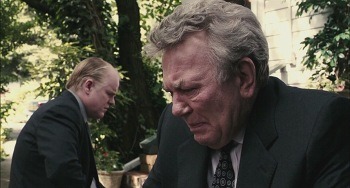 Before The Devil Knows You’re Dead
Before The Devil Knows You’re Dead
★★★★☆
Directed by: Sidney Lumet
Written by: Kelly Masterson
Let’s start off with the two fairly minor things that didn’t work very well for me in Before The Devil Knows You’re Dead. The first is the unnecessary POV-shifting, scene-revisiting, flash-back-and-forth construction of the film’s narrative. When a film like Pulp Fiction, which had lots of characters who all had individual arcs and criss-crossing story lines, fiddles with chronology, it makes sense because the narrative isn’t particularly linear or, more to the point, it isn’t as effective if told linearly. But in Before The Devil, there’s no point at which you can say, “If we already knew what was going on behind the scenes here, this would be less effective,” or “If we hadn’t gotten the other characters’ perspective on the scene with the current point of view character, we wouldn’t have as much empathy for what is happening.” The result then, is a gimmick. And there’s no need for a gimmick in a movie as riveting and powerful as this.
The second thing that didn’t work is Ethan Hawke. No disrespect to the actor, who does what he can, but I read that his character, Hank, was originally supposed to be a 19 year-old and was cast older to make him seem more tragic. Except it doesn’t make him seem more tragic, it makes him seem more unbelievable. Part of it is that the script, intending for Hank to be youthful, doesn’t ever have a chance to deal with the circumstances that might make a nearly forty year-old man into such a sniveling, un-worldly pantywaist. We’re just supposed to accept that Hank is this way but Hawke has too much soul in his eyes and too much natural presence in the world to sell the level of incapability he’s supposed to. Perhaps it was bad casting, perhaps Lumet just needed to leave the original script alone more, it’s hard to say.
But beyond this, we’re treated to a slow-motion train wreck of self-implosion and a study on causality that is gripping and delirious. The film follows Andy (played with an almost frightening amount of emotional range by the brilliant Philip Seymour Hoffman), an exec with demons to spare who comes up with a plan to help himself, his weak-willed brother Hank and his drifting/distant wife, Gina (played for the first half of the movie by Marisa Tomei’s breasts, then for the second half by Marisa Tomei’s bitten bottom lip). He concocts a victimless, nonviolent robbery of their parent’s jewelry store and tasks Hank with executing the plan. Through a series of sloppy preparations and sheer misfortune, the robbery goes bad and the impact of Andy’s plan sends shockwaves through their extended family. As things careen wildly out of control, the movie flips back and forth between Hank, Andy and their father Charles (played with mush-mouthed ardency by Albert Finney), showcasing the top down collapse of all three.
It’s a crime film that is more about family than glorifying lawlessness. It’s a movie that is, more than anything else, about the cost of decisions people make. These are not hardened criminals, they are desperate people who don’t seem to understand Newton’s Laws apply to human behavior as well as the natural world. It’s a family drama that plays out on a whole different scale than something more subtle, like perhaps Rachel Getting Married. Not that the two films are thematically alike at all, but the dissection of darker family secrets runs a connective thread between them and similar films, but where emotive dramas culminate in characters that rise above or grow beyond or simply take their leave, Before The Devil climaxes with the most complete depiction of a man pushed over the edge as I can recall seeing. Hoffman owns the last fifteen minutes of this movie, if he doesn’t own the entirety of it.
This is worth watching for his performance alone, and the rest of the movie is pretty good as well. I do wish they had made a couple of better decisions on the directorial end, but I can’t help but recommend watching, especially if you need to remind yourself that no matter how insane your family may be, it always could be worse.
Red State (2011)
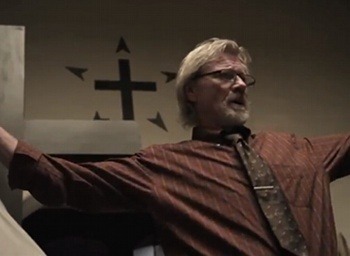 Red State
Red State
★★★☆☆
Directed by: Kevin Smith
Written by: Kevin Smith
I decided to watch Red State after finishing Writer/Director Kevin Smith’s book, “Tough S—t.” It’s a bit difficult to know whether it would have been a different experience to see Red State without the contextual framework provided by the discussion in the book. And, to be honest, some of that is even dependent on the facts of my familiarity with Smith’s other work, because I was a big fan of Clerks, Mallrats, Chasing Amy and to an extent Dogma, but starting with Jay and Silent Bob Strike back, I haven’t been as adamant about following along with Smith. I did get around to seeing Clerks II and Zack And Miri Make A Porno, but unlike the previous films which I practically saw on opening weekends, they were grudging, not-in-the-new-releases rentals. I never did see Jersey Girl or Cop Out. And I probably wouldn’t have bothered with Red State either, except Smith, in his book, describes it as his homage to Quentin Tarantino. And, well, I sort of masochistically wanted to see what a Smith-does-Tarantino flick would look like.
But this is why I think if I didn’t know that’s what Smith was doing, I wouldn’t have had the same reaction. Because Red State is a very different kind of movie from anything else he’s done. Oh, sure, Dogma had its scenes of intense violence and religious themes, but it was still essentially Mallrats with a much grander concept. Gone are a lot of the aimless asides and the shock-schlocky, replaced instead by a script that is curiously focused while at the same time never quite being pinpoint. It’s never easy to tell who the protagonist is in the story, though the villain is sort of obvious, except that it is really circumstance that propels most of the deplorable actions, not all of which are done at the hands of the “bad guy.”
Let me give you an example of one of the many unusual decisions Smith makes in the construction of this film: Following the initial set up and the introduction of a few key characters, Smith films almost the entirety of a sermon, delivered by Abin Cooper (played with a pitched charisma by Michael Parks) that starts off as a genial, inviting, small-congregation fireside chat but slowly—almost laboriously—descends into a seething roil of hate and hellfire, culminating in an uncomfortably unflinching ritual murder. Smith describes in his book a desire to never take the obvious path with his story and this comes through as the winding narrative feints this way and that, suggesting at various stages a campy sex romp, a torture porn thriller, a straight up horror slasher, a cop siege procedural, a dark morality tale, a supernatural allegory and a political potboiler. It’s sort of all and none of those things.
What it definitely adds up to is a Tarantino-esque indie shootout talker. On that level, knowing that’s what Smith wanted, it succeeds. From a pure storytelling standpoint, Red State is gripping and unpredictable, which is what I liked most about it. On the other hand, Red State also struggles in its effort to be unexpected, to have a sense of purpose. It seems like it might be fairly obvious that Smith is demonizing hate-in-God’s-name publicity morons like the Westboro Baptist Church (or any other unpleasant organization using warped ideals to judge or detest others) but aside from a base despicable-ness to their convictions, the Five Points Church (led by Cooper) respond to the circumstances the film throws them into with a peculiarly understandable motive. The “good guys” of the ATF, led by Joseph Keenan (played with superb, nuanced inner conflict by John Goodman), are the ones who, though ostensibly in the right, often make the most unconscionable decisions.
Most of the neutral parties caught in the middle are never really given a place in the theme, which means they become expendable to the script. Smith tries to make a certain amount of sense of it in retrospect with an overly expository interview scene. To an extent I like this choice because it cements the fact that tense, adrenaline-fueled scenarios like this only ever have context after the fact, but the highlight passage from the script in this scene suggests that Smith’s moral is the same as he leveled in Dogma: be wary of faith without reason.
And then the part that ultimately dropped the film an entire star for me comes in the epilogue. Note, this is (I guess) spoiler territory, but understand that the linear construct of Red State isn’t really that important; in any case, you can skip to the next paragraph if you don’t want to know. Anyway, the final scene in the film is Cooper in prison, wearing an orange jumpsuit and singing a hymn in his cell. It’s a long, intentionally ponderous shot and then finally, just before the credits roll, someone off camera (presumably a fellow inmate) hollers, “Shut the f—k up!” My problem with this is that it seems to be a semi-symbolic part of Smith’s message, hinting strongly that what he really has to say to misguided faith-based lunatics is “just go away.” I have a big problem with a film that is as thoughtful as Red State going for either a laugh or a frustrated outburst or both as its closing statement, especially coming from a guy who has made a career out of being overly honest, whether that’s with his character mouthpieces in his films or his podcasts or his spoken word public speaking or his book. It’s so simplistic and glib and counter-productive to summarize an issue like reconciling the troublesome nature of deplorable ideas that are so easily translated into antisocial actions with a simple gag order, even played for (non) laughs. The film, sadly, would have been at least 20% better without this final, 30-60 second scene.
All told, Red State is a promising new direction for Smith. Unfortunately, if you believe what he says in his Tough S—t book, it will be his penultimate film. Smith has been uneven as a filmmaker, even from the start, often accidentally achieving greatness. Here, he accidentally misses greatness and showcases a potential for something grittier and different from what others might say with similar material. And that’s exactly what you want from a filmmaker, I think.
The Call of Cthulhu (2005)
The Call Of Cthulhu
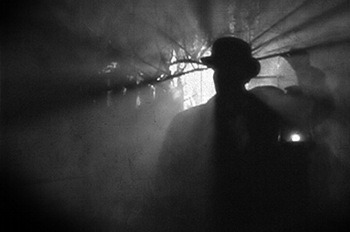 ★★★☆☆
★★★☆☆
Directed by: Andrew Leman
Written by: Sean Branney
Based on the Story by: H.P. Lovecraft
A very low-budget film done in the style of classic silent films, this is an incredibly faithful adaptation of the H.P. Lovecraft tale, including all the flashbacks, multiple characters, the framing device and the creepy sense of dread that Lovecraft was so good at—well, not good at writing since Lovecraft was a terrible writer. But good at inspiring, I suppose. Mythos fans should enjoy this movie a lot, though the stylistic choice worked well for me, I can see how people unfamiliar with Lovecraft may find it a bit plodding. Mostly the film just makes one realize how amazing a really well done modern update would be on screen.
Mirror, Mirror (2012)
 Mirror, Mirror
Mirror, Mirror
★☆☆☆☆
Directed by: Tarsem Singh
Written by: Jason Keller and Melisa Wallack
Based on the Fairy Tale by: Jacob and Wilhelm Grimm
In nearly every case, when presented with the opportunity to re-visit some entertainment media I’ve experienced before—a book I’ve read, a show I’ve watched, a movie I’ve gone to, a game I’ve played—I prefer to try something new. Often this is great because I end up with a wider breadth of pop culture reference points than someone who might, say, read the same book once a year or watch their favorite movie over again. However, sometimes it can result in a circumstance where I can reflect back and say with authority, “I’d have been better of going with the known quantity.”
This fact of consumptive life was reiterated with the recent decision for my wife and I to spend a day at the movies seeing either Mirror, Mirror or re-watching The Hunger Games. We went with the new, and we were punished sorely for it. The consensus we had upon exiting the theater: “We shoulda seen Hunger Games again.”
Cinematic regret aside, let’s talk—as briefly as possible—about Mirror, Mirror. This is a… different… take on the classic Snow White Grimm’s fairy tale. I suppose the hook is that it focuses on the villainess more so than the titular character (hence the re-titling) which, as Wicked apparently revealed, can be a novel concept. However, my impression is that Wicked re-casts the character of the antagonist where Mirror, Mirror takes a one-note bad guy and gives her an incredible and undeserved amount of screen time.
So let’s recap the basics of the original tale for comparison’s sake: A beautiful princess is born with ivory skin and dark hair and named Snow White. Her mother passes away, her father hooks up with a beautiful but criminally vain woman who comes with a talking mirror accessory. The mirror typically reassures the queen she’s the most beautiful woman in the world until Snow White grows up a bit and the mirror changes to Team Snow and the queen loses her grip. The queen implores a huntsman to kill Snow White in the woods but he can’t bring himself to do it so he lets her go, then tricks the queen with some hunted offal saying it is proof of the princess’ death. Meanwhile, Snow White finds a group of seven dwarves living together who agree to take her in if she’ll play housemaid for them and the queen thinks everything is ducky until she checks in with the mirror who reveals that Snow is still kicking around. The queen sets out to solve the problem herself by poisoning Snow, half-succeeds but is ultimately thwarted when a prince shows up and falls in love with Snow’s comatose body and manages to revive her without anyone filing necrophilia charges. The end.
Obviously the source material could use some work, so there is an opportunity here.
Unfortunately, what the writers did instead was take the one-note evil queen character and give her a lot of annoying scenes of being sort of passive-aggressively wicked. They then made the dwarves a band of bandits (instead of just pioneers or miners or something), included the prince much earlier in the tale but shoehorned a ridiculously hackneyed love-triange between him, the queen and Snow and made the huntsman a court lackey played by Nathan Lane. Oh, and they made the woods a sinister place by putting an oh-so-obvious Beast in it who never appears until it is necessary for the script that it do so. They also change the mirror to a sort of portal to a weird extra-dimensional green room type place and in a real casting coup, make Julia Roberts both the queen and the mirror-persona with some white face powder and sucked-in cheeks.
Of these changes the one that has potential is the dwarves being outcast bandits. What that does is facilitate their connection with Snow to be one of sort of banditry zen masters who teach the sheltered Snow to fight for her people. There’s actually a ton of possibility inherent in this concept, and the movie comes closest to working during the short montage sequence where she goes from being a befuddled shut-in to a capable, twenty-first century approved do-it-yourself heroine. Sadly, it’s a completely squandered idea that never quite fits in to the mess that makes up the rest of the film.
If I had to pick just one core element that makes Mirror, Mirror such a failure it would be this: Neither the screenwriters nor the director have any idea what kind of movie they’re trying to make. For the first maybe twenty minutes it seems like they’re trying to get a Princess Bride/Stardust kind of vibe going, which might have worked. Unfortunately, where William Golding and Neil Gaiman are good writers, Keller and Wallack are not and the humor never really works, the characters are never particularly compelling and, most importantly, the relationships between the characters don’t mesh. Take the connection between Snow and the dwarves. For one thing, the dwarves themselves don’t get enough screen time to ever develop even the most superficial sense of camaraderie, so it’s difficult to even accept them at face. Then they add Snow White into the mix and there just isn’t enough time given to make the connection between them gel, especially since the film keeps cutting back to Julia Roberts as the evil queen whenever it should be making the characters we’re actually intended to care about work as, you know, characters.
Sooner or later the film devolves into a cartoon (quite literally at one point) and utterly baffling sequences such as the mirror persona sending giant marionettes to attack the dwarves’ hideout waste time to no discernible end. There are hints at plot elements that should matter but don’t get any attention such as the price for the queen doing magic, which only manifests as some boring banter between Julia Roberts and—well, Julia Roberts. And let’s talk about Roberts for a moment, who, aside from hogging the screen (not her fault) fails to create anything even remotely resembling a full-fledged character, much less a full-fledged laugh, while she bounces between a terrible American accent and a much worse British accent at random (totally her fault).
Most of the other actors fare no better: Armie Hammer flounders as the prince who is written as a goon and a buffoon and who never once deserves Snow White but the film expects us to root for; Nathan Lane looks bored throughout and at one point is inexplicably transformed into a cockroach. The CGI cockroach upstages him. Also, the dwarves, many of whom are familiar and capable little people actors, struggle with sappy or dippy lines when they aren’t struggling with normal lines as well. Even the cameo by Sean Bean late in the film (if you think I’m “spoiling” the movie, you haven’t been listening to me) looks embarrassed to be there. Off topic: Why isn’t his name pronounced either “Shawn Bawn” or “Seen Bean”?
The one semi-bright spot is Snow White (played with a sort of accidental development by Lily Collins and her eyebrows), who manages to convey both timidity and confidence when the script calls for it (bearing in mind the script calls for it seemingly at random) so at the very least she sort of almost crafts a character out of the morass that is the script. Still, she never quite breaks the barrier between Disney’s animated version and the empowered rogue that I speculate the writers were aiming for so it’s not like I can recommend the movie for one second based on her work. When chain-smoking male animators had a better handle on your character seventy-five years ago—and this was when they cast her as basically the ultimate victim under the heavy lids of a sinister male gaze—something has gone off the rails in a bad way.
There is a single unqualified thing I can say about Mirror, Mirror that is not inherently negative: I didn’t loathe the movie. I mean, you can’t hate it. It sucks, it fails at everything it tries to do and it isn’t worth watching in any capacity, but it’s not deplorable. It’s just a crummy movie that tried something and failed. Like the kid at the pinewood derby whose wheels fall off before it even gets set on the track, you kind of want to pat the (ahem) creative forces behind it and say, “There, there, Mirror, Mirror.” And the good news is, in a couple of months Hollywood will have a chance to try again with the Kristen Stewart vehicle, Snow White and the Huntsman.
Then again, the last Kristen Stewart movie I saw I gave an even lower score, so maybe we should all just make plans to re-watch The Hunger Games again now.
Iron Man 2 (2010)
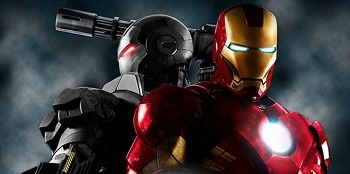 Iron Man 2
Iron Man 2
★★★★☆
Directed by: Jon Favreau
Written by: Justin Theroux
Based on the Comic Book Created by: Stan Lee, Don Heck, Larry Leiber, Jack Kirby
I think it would be fair to say that I was as surprised by Iron Man 2 as I was by the original Iron Man. I always liked Iron Man comics as a kid. In the 90s when everyone was rabid about Jim Lee’s run on X-Men and hyperventilating over Spawn and Youngblood and the new Image comics, I—well, I was right there with them. Look, the 90s weren’t great for comics. But I also spent an awful lot of my money on dirt cheap back issues of Iron Man, because as much as I liked the other, more popular heroes like Spider-Man and Batman, something about a guy who strapped on an awesome suit of techno-armor appealed to the burgeoning gadget nerd inside of me.
I never thought I’d see a big-budget Iron Man movie get made, and even when it did I didn’t think it would be very good. So I was pretty stunned when Robert Downey, Jr. turned in a magnificent Tony Stark performance and they pretty much nailed the character, the story and the production. Good for them, I thought at the time, they got lucky. It was this sense of fortuitous accident that I got from the first that led me to believe the sequel could never be as good and thus I pretty much ignored it until recently, seeing an ad for The Avengers, I got kind of amped to see more super hero flicks, even terrible ones.
So I found myself watching Iron Man 2. And it turns out, it was no accident that the first Iron Man was good.
Iron Man 2 picks up basically where the first left off (it’s a few months later), with Tony Stark as the rock star CEO/super protector of world peace, admired by all, so long as you except congress and the military who want Stark to turn over his Iron Man tech as a patriotic duty. Stark ignores their cries and clings tightly to the suit, which, along with his palladium replacement heart, is slowly killing him. The revelation of his impending death sends Stark on a sort of death mission, handing over CEO duties to Pepper Potts (still played with prim affection by Gwyneth Paltrow) and taking heavy risks like driving the car he sponsors in the Monaco Grand Prix himself.
Enter Ivan Vanko (apparently also called Whiplash, thought it doesn’t seem to come up in the movie, played with punk rock flamboyance by Mickey Rourke), son of Stark’s dad’s ex-partner who helped develop the tech that drives Tony’s suit and Iron Man. Bent for revenge for perceived crimes against his father, Vanko confronts Stark/Iron Man with a semi-suit of his own. This kicks off a firestorm as Stark’s assurances that Iron Man tech was so far ahead of the curve it would never be eclipsed are proven false and Stark continues his downward slide as pressure increases.
The plot gets pretty convoluted from there: not so much that you can’t keep up, just so that it kind of spirals into a disjointed series of events that you kind of have to hang on through because they do all tie together in the end. Lt. Col. James Rhodes (“Rhodey,” played to clipped perfection by Don Cheadle, stepping in for Terrence Howard from the first) confiscates a backup suit from Stark’s lab; Stark’s new assistant, Natalie Rushman (Black Widow, played with curiously un-alluring hot/cool sexuality by Scarlett Johanssen) loops Nick Fury (played by professional scenery chewer, Samuel L. Jackson) into the deal, where he provides the macguffin necessary for Stark to recover and to propel some nice character development; Stark business rival Justin Hammer (played with effectively whiny villainous arrogance by Sam Rockwell) breaks Vanko out of prison and hires him to perfect his own version of the Iron Man suit and the stage is (mostly) set for the epic finale.
Let me just say that director Jon Favreau’s sense of pacing is precise in this movie. So many other super hero sequels stumble by trying to cram too much into a movie just because they already have the backstory covered, but despite the complexity hinted at by the paragraph above, it actually flows very nicely together with minor set pieces and some smart, funny dialogue propelling even the non-SFX portions. And kudos to the screenwriters for avoiding the temptation to cram extraneous villains into the screenplay; Justin Hammer is an ideal foil to Stark on the personal/professional side and while Vanko/Whiplash isn’t exactly a humdinger of a foe for Iron Man, the finale is as explosive and exciting as you could really want from a summer blockbuster. A massive hat tip for including War Machine, too, which is every bit as cool as its name implies.
Are there problems in Iron Man 2? Sure. Some of the rapid-fire dialogue isn’t quite as smart or as funny as its supposed to be (though a lot of it actually is), there are a few too many shots of Rhodey and Stark’s faces with blinking Iron Man lights flashing on their faces and the Pepper Potts storyline wrap-up feels like a rehash from the first. But any movie that has super-powered future tech like the Iron Man suit in it and still manages to make Black Widow’s infiltration of Hammer Industries look badass (and provide one of the movie’s funniest scenes/lines to boot) has something really good going on.
I thoroughly enjoyed Iron Man 2 and while I’m not sure that lightning can strike three times (Iron Man 3 is supposedly coming out in 2013, though without Favreau at the helm), I’m not going to be so quick to dismiss next time.